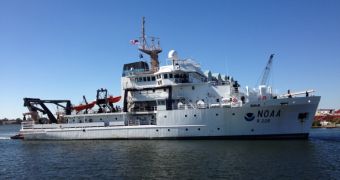Officials with the US National Oceanic and Atmospheric Administration (NOAA) announce that the organization has finally taken delivery of their latest ship. The Reuben Lasker fisheries survey vessel is the newest high-tech tool the agency will have for surveying the world's oceans.
This vessel is named after Dr. Reuben Lasker, who was the director of the Coastal Fisheries Division at the NOAA Southwest Fisheries Science Center. The expert was a pioneering fisheries biologist, and also an adjunct professor with the University of California in San Diego's Scripps Institution of Oceanography.
Lasker contributed to advancing fisheries management across the world by leading a research team that conducted in-depth research on how young fish transition into adulthood. Based on such data, fisheries developed more suitable and sustainable standards for ensuring the world's fish supply.
The NOAA ship bearing its name was developed by Fincantieri company Marinette Marine Corporation, and is outfitted with the latest tracking and study technologies. Its main mission will be to survey the US West Coast, and especially the eastern tropical Pacific Ocean.
“Reuben Lasker represents a significant milestone in the agency’s efforts to provide world-class marine science platforms. This state-of-the-art ship will play a key role in supporting NOAA’s mission and serving the nation,” says Rear Admiral Michael S. Devany.
Devany is the director of both the NOAA Corps and the NOAA Office of Marine and Aviation Operations. The ship is about 63 meters (208 feet) long, and is the fifth Oscar Dyson-class ships built specifically for the agency.
The vessel was assembled at MMC’s Marinette, Wisconsin-based shipyard. Its construction was partially covered through the American Recovery and Reinvestment Act (ARRA) of 2010. A complex package of advanced navigation systems, acoustic sensors, and scientific sampling gear was installed.
“MMC has a long, established history of delivering exceptionally crafted and complex vessels. The talented and skilled workers of MMC are proud to deliver this high quality vessel to NOAA in support of its important mission,” says the company's CEO, Chuck Goddard.
Reuben Lasker will be commissioned in early 2014 and will be based in San Diego, NOAA officials announce.

 14 DAY TRIAL //
14 DAY TRIAL //